Book Digest: April 23, 2007
I should warn you that of all the events of the past month (besides the commencement of the 2007 Major League Baseball season) Kurt Vonnegut’s passing sticks with me most—well, not so much his passing, but his living. So here I will treat you to a brief, though hardly final reverential recollection of the great Indianan.
Here, from an interview with Roger Friedman at Fox News on his 80th birthday:
RF:
KV:
RF:Revolutionary Road
KV:
RF:
KV:Cat’s Cradle
Also via the flying monkeys at Fox News: “…By the late seventies, Vonnegut was rich and irrelevant, the subject of other people’s books, a sacred cow of the New York literary scene…” One of my sharp-eyed editors passed me this dribble.
And as long as I have the chance, here’s one of my favorite of Vonnegut’s acute observations, from Slaughterhouse-Five:
Out Stealing Horses by Per Petterson
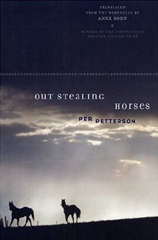
Located in the great American city of Minneapolis, Graywolf Press brings you and me Norwegian novelist Per Petterson’s Impac Dublin Prize short-listed novel. In literary journalism (despite the sidereal relevance of that bit of news), that’s supposed to get your attention. Rather, I would hope that this slim synopsis does that: 50 years after something happened while joyriding on a stolen horse, something else happens to Jon that jars him back to that earlier something.
No doubt somebody felt the sympathetic resonance of Peterson’s novel with Marilynne Robinson’s masterpiece Gilead, as she is scheduled to speak with Petterson at the PEN World Voices Festival on April 27th. Also the winner of the Independent Foreign Fiction Prize, that same newspaper said of Out Stealing Horses: “…looks like a charming but modest chamber piece. In retrospect—and this is a novel that strikes deep and lingers long—it feels more like some shattering literary symphony.”
Sounds wonderful, yes?
» Read an excerpt from Out Stealing Horses
Selected Poems by Derek Walcott
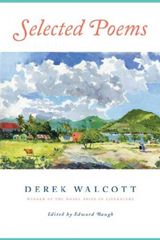
I am pleased to report it is still Poetry Month in our fair (in the sense of visual aspect, not on a host of vital issues) land. St. Lucia-born Nobel Prize winner Derek Walcott adds to his already substantial corpus with this carefully edited anthology, which includes an introduction by the Jamaican poet and critic Edward Baugh. Here’s a finely honed homage from the Nobel Prize presentation:
Get it?
Biography: A Brief History by Nigel Hamilton
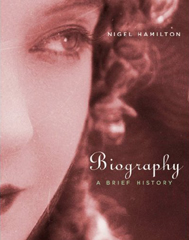
Biographer Nigel Hamilton, who is currently alleged to be writing a three-volume biography of President Clinton, turns his scholarly gaze to the art of recording the lives of others and ourselves. Atlantic editor Scott Stossel suggests:
Naturally, one wonders to what degree the main thrust of this book—an apologia for the art of biography—is really an apologia for the art of biography as practiced by Nigel Hamilton. But in any case, he has produced a rich and provocative meditation on the history of biography, albeit one marred by an overblown central argument… [he] seems almost to suggest that a decline in the quality of biography in the West led to the rise of Hitler and Hirohito. If only we’d had more incisive biographies, democracy would not have been so imperiled in the 1940s!
Silly arguments aside, given the publishing onslaught of biographies, memoirs, and pathographies (thanks, Joyce Oates), tilling the genre’s fertile fields beyond the strictures of Plutarch and Samuel Johnson is, I believe, self-evidently of great value.
How I Write: The Secret Lives of Authors edited by Dan Crowe and Philip Oltermann
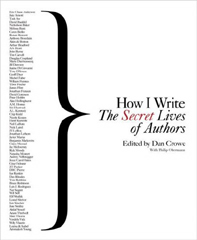
Dan Crowe, who is editor of the now-defunct Zembla magazine and “the best-read fashion magazine in the world,” Another Magazine, edited this inside-baseball-style anthology on the glamorous and mysterious alchemical art of fiction writing. Designed by Vince Frost, there are 60 features by an impressive array of practitioners of the sacred art of literary fiction, including Jonathan Franzen, Jeffrey Eugenides, Joyce Carol Oates, Rick Moody, Will Self, Lionel Shriver, and many others.
Incidentally, this tome is a more lighthearted and visually exciting romp through the cornfields of literature than the Writers on Writers anthologies and the interviews published by the New York Times and the Paris Review.
Sick: The Untold Story of America’s Health Care Crisis and the People Who Pay the Price by Jonathan Cohn
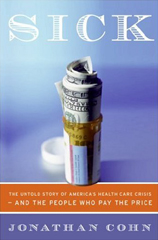
Harvard graduate, New Republic smarty-pants, and contributing editor at The American Prospect Jonathan Cohn tilts at America’s health-care system. Not exactly a glamorous topic—what else explains the American citizenry’s failure to rise up in anger at the chuckleheaded politicians in the U.S. (“the only country in the developed world that does not guarantee access to medical care as a right of citizenship”)? Cohn travels around the country, linking woeful anecdotes of health failure to negligence and criminality, making the subject of declining health care more narratively available.
The Unknown Terrorist by Richard Flanagan
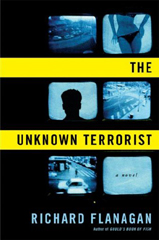
Tasmanian polymath Richard Flanagan’s previous novel, Gould’s Book of Fish, which also won the Commonwealth Writer’s Prize, apparently was one of those warm and cuddly books to which readers could snuggle up. As suggested by the title, his new novel is a thriller formed around the what-if of finding oneself seriously suspected of involvement in a terrorist attack. The mayhem that devolves from the by-now-familiar background music of fear, hysteria, and misinformation woven into this fast-moving plotline by an acknowledged master storyteller puts the thrills in “thriller.”
» Read an excerpt from The Unknown Terrorist
Shakespeare’s Kitchen by Lore Segal
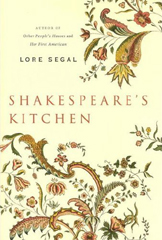
In book-selling and reviewing, when it comes right down to it, what’s most effective (and of most value) is hand-selling: word-of-mouth personal recommendations. In Lore Segal’s case, this includes endorsements by Cynthia Ozick (“Other People’s Houses is inconceivably moving” and James Marcus’s encomium of this collection of 13 interrelated stories (many of which have previously appeared in The New Yorker), in which he maintains:
Other People’s Houses
Presence by Arthur Miller

Death of a Salesman no doubt would assure any playwright induction into dramaturgy’s Hall of Fame but then there were also All My Sons, An Enemy of the People, The Crucible, A View from the Bridge, Incident At Vichy, Resurrection Blues, and so on and so forth. Hidden in plain sight, Miller wrote short-form fiction throughout his life—for example, The Misfits, a much-celebrated film with Miller’s then-wife Marilyn Monroe, Clark Gable, and Montgomery Clift, and directed by John Huston, was based on Miller’s short story. This new book anthologizes some of Miller’s later work, which originally appeared in magazines such as The New Yorker, Harper’s, Esquire, and so on.
Here, from the title story:
He wakes at quarter to six, sun in his face, still tight about being criticized for not doing enough for women, slips into walking shorts and sandals with a glance toward her exposed arm, and thirsty for the morning fog steps out into the chill, walks toward the beach road in the swirling mist, grateful even to the dimmed sun for its uncomplicated touch of warmth on his back. The row of sleeping beachfront houses and their dozing cars alongside the road, his sandals whispering, he searches for the public path down to the beach and at last finds it alongside the last house in the row. On the brow of the path before it descends he pauses for his first glimpse of the sterling ocean, his hallowed homewater from so long past in childhood, when it loved him and scared him into sparkling and foamy white on top and dark below with live things in its holy depths. Once he had nearly drowned, at six, seven. Another step now descending upon the tippy, blanched gray planks, and through the long spear grass alongside him a white body suddenly, a man in his black T-shirt seen from his overhead…
I hope and believe you will excuse this digression: here’s Kurt Vonnegut on Miller (and Susan Sontag).
Age of Betrayal: The Triumph of Money in America, 1865-1900 by Jack Beatty
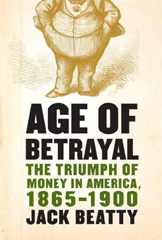
As America’s so-called Gilded Age echoes in the high-flying late decades of the last millennium, marked by a depraved economic stratification that more resembles the Dark Ages and progresses unchecked here in the great land of Wal-Mart and General Motors, it may be something of a relief to review the last third of the 19th century—a time when the robbers at least had some attributes of nobility and crime had a certain earmark of innocence. Today, methinks, American oligarchs are simply out-and-out thieves.
Jack Beatty, who must be ambidextrous—he is an editor at the Atlantic, a news analyst for the On Point radio program, and an accomplished author—is a skillful narrator and scholar. Here he recounts the trumping of democracy by a handful of oligarchs—Jay Gould, Andrew Carnegie, John D. Rockefeller, and J.P. Morgan—who were complicit with an oligarch-friendly Supreme Court during post-Civil War America. Beatty’s well-modulated and justifiable outrage, you must believe me, are necessary.
